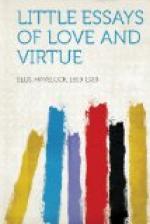It is not scientific research alone, nor even the wide popular diffusion of knowledge, that will suffice to bring eugenics and birth-control, singly or in their due combination, into the course of our daily lives. They need to be embodied in our instinctive impulses. Galton considered that eugenics must become a factor of religion and be regarded as a sacred and virile creed, while Ellen Key holds that the religions of the past must be superseded by a new religion which will be the awakening of the whole of humanity to a consciousness of the “holiness of generation.” For my own part, I scarcely consider that either eugenics or birth-control can be regarded as properly a part of religion. Being of virtue and not of grace they belong more naturally to the sphere of morals. But here they certainly need to go far deeper than the mere intelligence of the mind can take them. They cannot become guides to conduct until their injunctions have been printed on the fleshy tablets of our hearts. The demands of the race must speak from within us, in the voice of conscience which we disobey at our peril. When that happens with regard to ascertained laws of racial well-being we may know that we are truly following, even though not in the letter, those great spirits, like Galton with his intellectual vision and Ellen Key with her inspired enthusiasm, who have pointed out new roads for the ennoblement of the race.
II
It may be well, before we go further, to look a little more closely into the suspicion and dislike which eugenics still arouses in many worthy old-fashioned people. To some extent that attitude is excused, not only by the mistakes which in a new and complex science must inevitably be made even by painstaking students, but also by the rash and extravagant proposals of irresponsible and eccentric persons claiming without warrant to speak in the name of eugenics. Two thousand years ago the wild excesses of some early Christians furnished an excuse for the ancient world to view Christianity with contempt, although the extreme absence of such excesses has furnished still better ground for the modern world to maintain the same view. To-day such a work as Le Haras Humain ("The Human Stud-farm”) of Dr. Binet-Sangle, putting forward proposals which, whether beneficial or not, will certainly find no one to carry them out, similarly furnishes an excuse to those who would reject eugenics altogether. Utopian schemes have their value; we should be able to find inspiration in the most modern of them, just as we still do in Plato’s immortal Republic. But in this, as in other matters, we must exercise a little intelligence. We must not confuse the brilliant excursion of some solitary thinker with the well-grounded proposals of those who are concerned with the sober possibilities of actual life in our own time. People who are incapable of exercising a little shrewd commonsense in the affairs of life, and are in the habit of emptying out the baby with the bath, had better avoid touching the delicate problems connected with practical eugenics.




